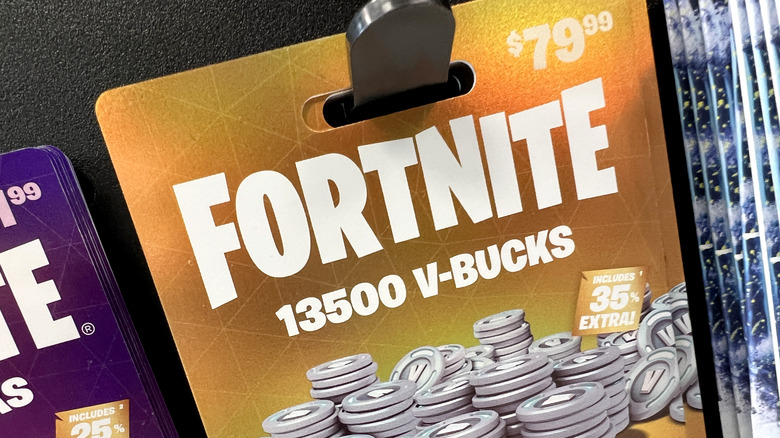What Does VC Stand For In Gaming? Here's What You Need To Know
The world of video games abounds with acronyms that can be inscrutable to all but the most dedicated players. You might need to know the TTK (time to kill) of a boss in an MMO (massively multiplayer online game), or how much DPS (damage per second) a particular weapon can output in a PVP (player versus player) FPS (first-person shooter). Things get even more confusing when the acronym in question has multiple, context-dependent meanings, which probably explains why so many people seem to get tripped up by one acronym in particular: VC.
You may have heard VC used in multiple contexts, and you can't quite figure out what it means. Some people seem to be talking about communicating with teammates when they use it, while others appear to be talking about some kind of money. So, what does VC mean? Vitamin C? Verbal communication? Video-game connoisseur? In the context of video games, there is a range of context-dependent meanings for this acronym. In the world of gaming, VC most often means one of the following: voice chat, virtual currency, virtual console, or venture capital. So, without further ado, let's break down what each of those terms means, so you can understand how it's being used when you encounter it in different contexts.
Voice chat keeps you connected with teammates
Among the most common uses of the acronym VC in the context of video gaming is in reference to voice chat, which is a system in a video game that allows players to speak with one another one-on-one or in a group using a microphone. This is often in contrast to TC, or text chat, which allows players to type out messages to one another. Many video games rely heavily on voice chat for success, especially those like competitive multiplayer shooters, such as "Valorant" or "Counter-Strike."
It is common in many gaming communities to require people joining one's team to have "VC enabled," or similar phrasing, indicating that joining team members will be expected to have a microphone equipped so they can participate in the chat. Often, teammates will be expected to call out enemy positions, suggest strategies, or otherwise communicate effectively to benefit the team's chances of success. Those who do not have VC enabled, or who do not participate, will often be kicked by team leaders in many games. These players will often be accused of "griefing," which means deliberately making the game harder for one's teammates.
Voice chats can be joined in-game when playing certain titles, but you may instead be asked to join a call in Discord or another calling app. To make sure your VC is correctly set up, check your computer's audio settings and game settings. If you don't have a headset with a microphone, you can check out six of the best headsets for Xbox Series X and other platforms.
Virtual currency lets you purchase in-game items
Another common use of the acronym VC refers to virtual currency, which is in-game currency used to purchase in-game items like cosmetic skins, materials, and so forth. The popular use of VC in this context can be seen in the "NBA 2k" basketball series, wherein the in-game currency is acronymized to VC within the game's various menus and purchase points, but virtual money existed in games far before that.
Sometimes, a game can have multiple forms of virtual currency, with some attainable by playing the game and others requiring a microtransaction. For example, in "Destiny 2," there exists both Glimmer and Silver. While Glimmer is the primary in-game currency and can be earned by simply playing, Silver must generally be purchased with one's own, real-life money and is used to buy the most coveted cosmetic items from the game's virtual storefront, Eververse. Paid virtual currencies have often been criticized as predatory, since they often use mechanisms akin to gambling and appear in games that are popular with children. Additionally, many games force players to buy virtual currency in set amounts, which means they must pay more than is strictly necessary for the in-game item they wish to purchase. And because in-game currencies often have difficult to calculate exchange values with real money, it has been suggested that this is another effort to manipulate players, especially young ones, into overspending in their favorite games. For example, one teen claimed he spent $10,000 on microtransactions.
This use of the term may sometimes be made confusing by the existence of cryptocurrency, which is sometimes also referred to as virtual currency. However, unlike crypto, purchasing video game currency will guarantee you can get your hands on a new cosmetic in "Fortnite."
Virtual consoles let you play old games on modern hardware
One more use of VC is to refer to a virtual console, which is an emulator for older gaming hardware that can run on current generation gaming hardware. This term was popularized by Nintendo, which launched the Virtual Console as a way for owners of its Wii consoles to play older games from the NES, SNES, and Nintendo 64 which are no longer supported by new hardware. Though it was discontinued in 2019, some people still use the term to refer to similar systems.
Some examples of virtual consoles include Sony's PlayStation Plus service, which includes the ability to stream games from older PlayStation generations, which makes it one of the best uses for an old PS4, and Xbox Backward Compatibility, a service that allows Xbox owners to play games from the original Xbox, Xbox 360, and Xbox One. The term VC in this context refers strictly to this sort of emulation, and is not to be confused with a service like Xbox Game Pass, which lets players download contemporary games with an à la carte model. Unless an older console is being emulated, either locally or in the cloud, the term virtual console does not apply.
Venture capital helps fund new games
VC has one meaning that's not related to gameplay, but rather the games industry: Venture capital, often shortened to VC, refers to money invested into a game studio, publisher, or other entity by an investor or an investment firm. Venture capital is among the most important sources of funding that flow through the games industry, since it can often determine which small studios survive. You may also hear VC used in the plural (i.e., "VCs") within this context to refer to individual venture capitalists. Certain influential venture capitalists are highly sought after. Think of people like Mark Cuban or Marc Andreessen, both of whom have invested in video game ventures. Investors like them often contribute to startups with the expectation of a huge payout when the company becomes successful.
Video games are extremely expensive to produce, often requiring multiple teams of people across multiple specializations from humanities like art, design, and writing, to computer science professionals who specialize in games development. Because of this, small studios often require some kind of funding to complete even a game of modest ambition. However, even major games will often take VC funding. For example, Game Developer reported that "Fortnite" publisher Epic Games took $1.2 billion in venture funding from multiple investors in 2018.




